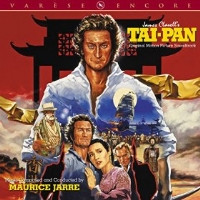- Composed by Maurice Jarre
- Varèse Sarabande CD Club / 2012 / 37m
The second of James Clavell’s “Asian saga” of novels, Tai-Pan reached the big screen in 1986, twenty years after the novel had been published. Set in Hong Kong in the aftermath of the First Opium War between Britain and China in the mid-19th century, the film focuses on the rivalry between the heads of two large trading companies, each seeking to be number one. Filmed (with great political difficulty and necessitating much censorship) in China, it was an ambitious, large-scale production overseen by Raffaella de Laurentiis and directed by the Canadian Daryl Duke; but when it was finally released the film was met with almost universal critical disdain and proved to be a box office disaster.
The 1980s were unquestionably the weakest part (by far) of the legendary composer Maurice Jarre’s long career in film. His experimentation with electronic music was spectacularly ill-advised and led to a number of completely terrible film scores, several of which have been released and make completely terrible albums. Quite what prompted this grandstanding old romantic to abandon everything that made his music so attractive and popular has long confused me – but he did. But when he left the synths at home, he did still write some grand orchestral gems during the decade – The Lion of the Desert, A Passage to India, Mad Max Beyond Thunderdome – and Tai-Pan is the best of the lot. (At the start of the decade, he had scored the miniseries adaptation of another of the novels in the series, Shogun.)
It’s a score dominated by a solitary theme (admittedly made up of several distinct sections), given a portentous introduction in the opening titles – an array of percussion, brass and strings, it’s a barnstormingly big piece, with a hint of an Asian sound to it; it’s a magnificent theme. It’s amazing just how many absolutely huge variations on it Jarre managed to pack into the film – “May-May” perhaps the biggest of the lot. It’s a bit overwhelming in context, but on album it’s just a joy. Anyone who loves the great big expansive sound of the composer’s classics like Lawrence of Arabia and The Man Who Would Be King will be in heaven.
Jarre gets some romantic mileage from it too, with maximum sweep extracted from the strings on occasion but some rare smaller, more intimate moments too (“Jinqua” in particular is gorgeous – but even that, after its intimate moments, just gets bigger and bigger and bigger). The action often features an extraordinary battery of percussion (as so many of Jarre’s scores do – he was, after all, a percussionist before becoming a film composer) and there are some interesting textures here, particularly in “Chinese Fog”, which also features the pentatonic writing which added a little local colour to the main title. As the album nears its climax, the lengthy “It Was a Boy” goes on an epic dramatic journey of its own, beginning with relatively low-key dramatic murmurings and a set of variations (including some of the score’s most emotional and romantic) on the main theme and growing to a predictably gigantic conclusion. There’s one more opportunity to blow your speakers out, the blockbuster finale “A New Tai-Pan”.
This is such a rousing, gargantuan epic of a score it can be quite exhausting at times, but never in a bad way and the relatively brief running time of the album ensures there is never a sense of it being all just a bit too much. This 2012 release was part of the Varèse Sarabande CD Club and was a straight reissue of the label’s earlier release, with new notes by Jim Lochner and of course remastered sound. It quickly sold out but is available for download from iTunes and Amazon. It’s a magnificent piece of work, featuring all the qualities that make Jarre’s best scores amongst the best scores – and this is absolutely one of his best. You need a lie down after listening to it, but boy is it worth it.
Rating: *****
facebook.com/moviewave | twitter.com/MovieWaveDotNet | amazon.com













Clavell works really seem to inspire composers – the modern-day sequel “Noble House” got one of Paul Chihara’s best efforts.
Thanks for making me aware, James. I just purchased this score on your recommendation! Thankfully, despite being out of print, I could still find it for a reasonable $30 on eBay.